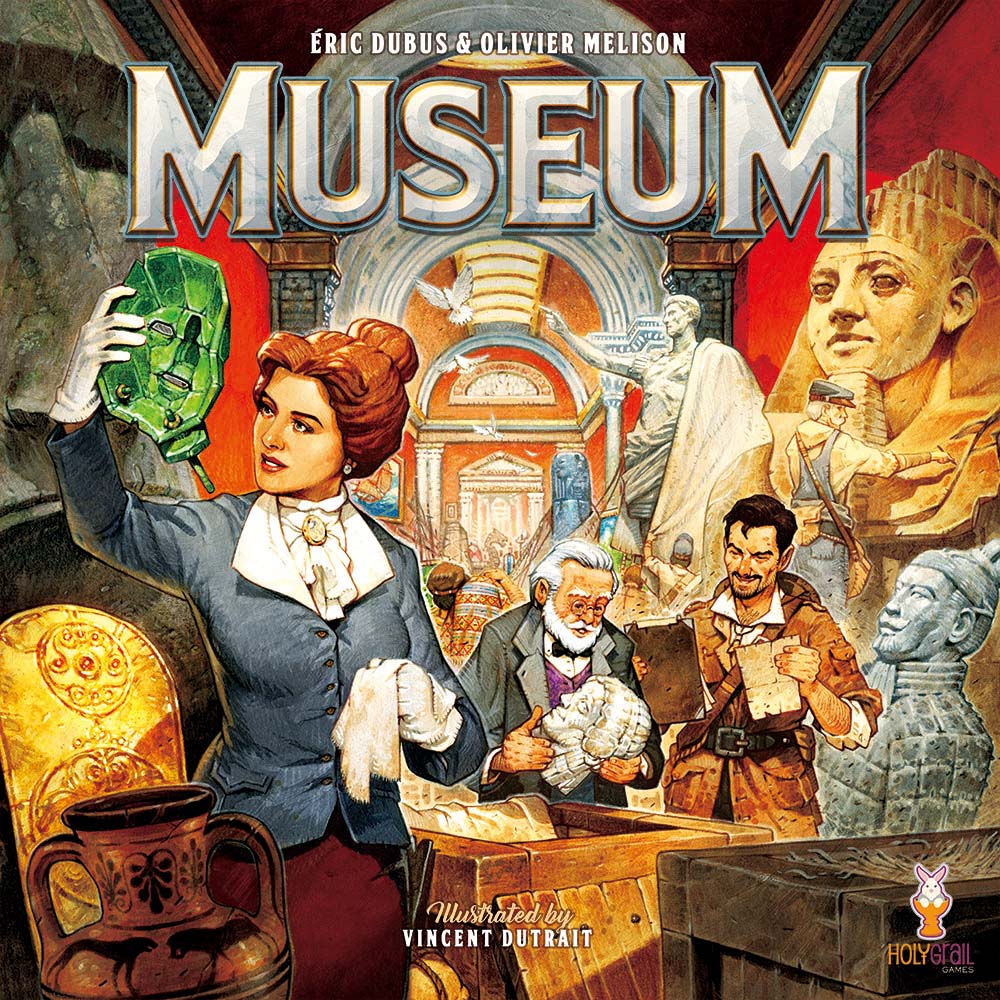Museum is getting a second edition! Following the feedback we’ve received from players and our distributors since the game released in early 2019, we’ve been working hard with the authors of the game, Olivier Melison and Eric Dubus, to make a few tweaks to the rules and cards to make Museum a more satisfying experience.
So, what’s changing for Museum 2nd Edition?
The Turn
Overall, we’re very happy with the flow of a player’s turn. It’s relatively quick, involves other players and keeps downtime to a minimum.
That being said, there’s a few changes we’ll be making.
Furbishing your Museum
Combining purchases
Originally, when placing objects into your Common Pool, we wanted players to be able to discard a certain number of points worth of cards and tokens, before spending those X points on a mixture of object cards, experts, archaeologists, black market cards, etc. However, this has led to a bit of confusion so we’re going to simplify the process.
The way you purchase certain things in the game will be changing. This not only allows us to make the game more dynamic but also solves the issue of clarity. We’ll go into more detail about other types of cards below, but as far as Object cards are concerned, you’ll now only be discarding Object cards (and prestige points) to exhibit other Object cards. So, if I discard 7 points worth of Object cards, I can exhibit any number of cards up to a value of 7 from my Personal Reserve or my Common Pool into my museum. The rules for exhibiting cards from other players’ Common Pools remain the same.
Experts
We’re overhauling Experts rather heavily. They work just fine, but we feel players aren’t using them as much as we had hoped, especially the ones that conferred abilities instead of Collection bonuses.
So, the approach is twofold: first, we’re reducing the cost of ALL experts to 2. To counterbalance this and avoid any issues, Experts can now only be hired with Prestige Points. You may no longer hire Experts by discarding Object cards.
We hope that this will make ALL the Experts much more attractive a purchase, whereas the use of Prestige Points should stop them being abused in ways we may not have thought of.
Additionally, some of the underpowered experts will be receiving a bit of a buff. For example, Richard Bellota now allows you to draw Favour cards when purchased, as well as increasing your Favour card hand limit to 5. For only two Prestige points he can give you a good advantage early in the game or put some resources back into your hand later in the game.
Others Experts will be rebalanced, such as the notorious Ulf Van Der Noot. He will now allow you to give players a Prestige Point from the supply, rather than your personal reserve, when purchasing cards from someone else’s Common Pool.
We think these changes will make Experts a much better purchase, whether it be situational, opportunistic or strategic.
Inventory
We found that performing an Inventory, whilst of a good strategic value when used at the right time, felt too punitive to many and gave the impression of a loss of tempo. We’re therefore making two changes to the Inventory action:
- When performing an inventory, you may not exhibit objects in your Museum but you can still play Favour cards and you may now also hire Experts (and deploy Archaeologists in the case of the expansion).
- Once you’ve performed your Inventory action, you also get to draw a Favour card and gain 2 Prestige points, both of which can be used immediately.
With these changes, we feel that players will use this action more frequently in their games and the benefits will match up to the inconvenience of not being able to place any object cards that turn.
Favour cards
We’ll be proceeding with a few corrections on the Favour cards, mostly rebalancing a handful of them.
The major element that’s going to change however is that all Favour cards will acquire a new ability. Now, you’ll be able to discard a Favour card which counts towards playing your one Favour card per turn) in order to take any available Object card from the board. This means that whenever or whatever Favour card you draw, it’ll always be of use to you.
End of the Game
Reaching 50 points and the final turns
We received some criticism about the end of the game as some thought that the first player to cross the 50 point line was disadvantaged as they didn’t get to play another turn whereas everyone else did.
It was always our intention that setting off the end of the game would be a conscientious choice in Museum, not something that just “happened” to you. Finishing the game is, especially in high-level play, a very important decision and not one we wanted players to take lightly.
We’ve always said that we believed that this end game mechanic did not advantage or disadvantage any players in particular and, after many, many more playthroughs, we stand by that statement.
We did try two, more standard, end of game set ups during testing:
The player that crosses the 50 points line first signals the end of the game and everyone gets to play one more turn. – We found this to be strategically uninteresting. You could just waltz over the finish line and the final turns were just like all the others.
The player that crosses the 50 points line first signals the end of the game and we finish the round – We found this to be very advantageous to the last player and most of their turns in later games revolved around people wondering if they were going to end the game or not.
We’re not saying that these ways of doing things are bad, we just feel that they just don’t work with Museum specifically.
However, we don’t want to seem like we’re ignoring feedback, so, in order to give the player that crosses the finish line first a bit of a bonus, they’ll receive 5 additional Victory Points. It may not seem like much, but you’d be surprised how much of a difference it made to some of our test games!
Patron cards
Our goal when designing the objectives was very simple: Museum is a simple game at heart but has a lot of options for you to consider each turn. The Patron cards were meant to give players, especially newer ones, some direction at the start of the game.
Whilst the current Patron cards accomplish this, they’re slightly too…engrossing, shall we say. The cards themselves require so much effort and reward so many points that they take over the game. Whilst it is perfectly possible to win without fully scoring your Patron card, most players will fixate on what this card asks them to do and won’t look for other opportunities outside of it. This leads to many a situation where players, especially newer ones, would lose because they invested too heavily in their objectives and could not complete them whereas, if they could have seen their way to exploring other avenues of collecting points, they could have won. These current cards are, in a way, blinkers. They keep the player looking in only one direction and stop them from seeing all the cool options they have at their disposal.
Therefore, we’ll be redoing the Patron cards. We’ll be reducing the effort required to complete them as well as the amounts of points they reward. Most will have three conditions rewarding 5 points each.
These easier to achieve Objectives mean that players can either fulfil them early and move on to building their own strategy for the rest of the game. Or, if they are unable to complete them early in the game, allow them to complete them quickly late game should the opportunity present itself. This should encourage a lot more flexibility when it comes to building Collections and reduce the frustration of not completing your Patron card.
For those that may be worried, these new cards aren’t pushovers. They require some careful thinking and that you diversify your actions in order to complete them, but are more easily incorporated into the strategy you choose, instead of forcing you to go in a certain direction.
Collection Values
Whilst we were happy with the balancing of points between Civilisation and Domain collections, we felt that there was a slight bias towards Domain collections. Their rewards ramped up quicker and smaller collections were still worth the effort even if they didn’t grow much, compared to Civilisation collections.
To remedy this, we’ve slightly increased the yield of smaller Civilisation Collections and reduced that of smaller Domain Collections. In our play testing this has most certainly encouraged more diverse Collections and strategies.
If you would like to move your copy of Museum to 2nd Edition, you can get a Upgrade Pack at cost on our Museum Deluxe Kickstarter campaign.
Moving to 2nd edition rules is in no way mandatory to continue enjoying your copy of Museum. If you have any questions about the rules, feel free to visit the Museum FAQ.
If you can’t find the answer to your question, feel free to contact us using the email address supplied on the FAQ page, we’ll get back to you as soon as we can!


